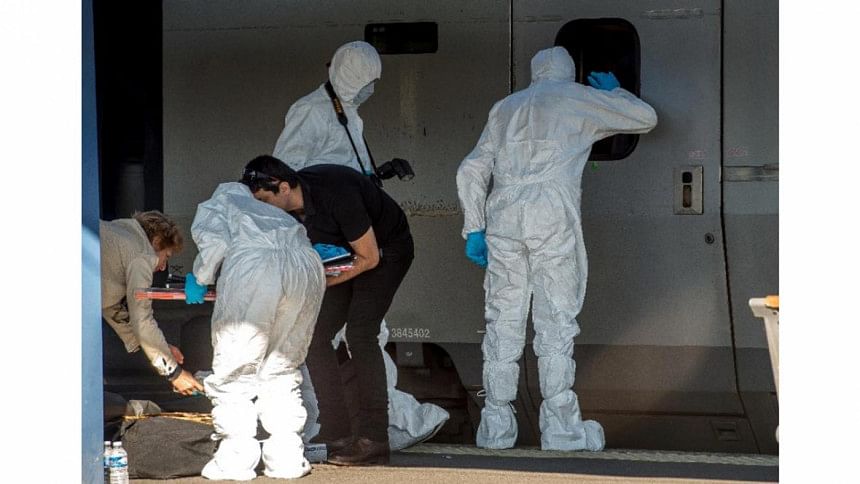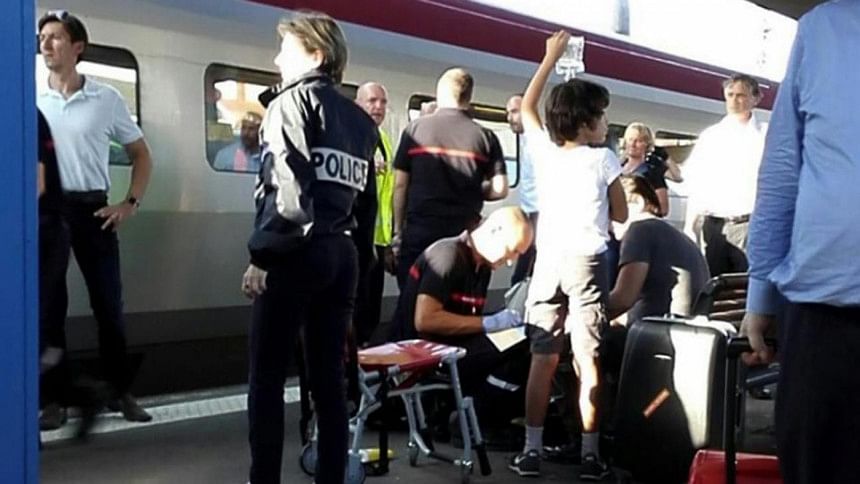France train gunman questioned over Syria links

Authorities interrogated a suspected jihadist gunman who was overpowered by passengers on a packed Amsterdam-Paris train, as officials say he had visited Syria and was known to intelligence services.
The alleged attacker, named as 25-year-old Moroccan national Ayob El Khazzani, opened fire with an assault rifle on Friday evening, but was wrestled to the floor by three American passengers who have been hailed as heroes.
The shooting, which underlined the difficulties faced by intelligence services tracking an unprecedented number of potential jihadists, is expected to lead to tighter security for international train services in mainland Europe.
Armed with a Kalashnikov assault rifle, a Luger automatic pistol, nine cartridge clips and a box-cutter, the attacker opened fire on board the high-speed train just after it crossed from Belgium into northern France.
A French passenger tried to disarm Khazzani as he exited a toilet cubicle, but he got away and fired several shots.

Then a Franco-American traveller in his 50s clashed with the man and was shot and wounded. But the attack was quickly stopped when two off-duty US servicemen and their friend charged the gunman and restrained him.
"I looked back and saw a guy enter with a Kalashnikov. My friends and I got down and then I said 'Let's get him'," Alek Skarlatos, a 22-year-old member of the National Guard in Oregon who recently returned from Afghanistan, told France's BFMTV.
Spencer Stone, who serves in the US Air Force, was first to the gunman, who slashed him in the neck and almost sliced off his thumb with a box-cutter.
"At that point I showed up and grabbed the gun from him and basically started beating him in the head until he fell unconscious," said Skarlatos.
His friend Anthony Sadler, a 23-year-old student at Sacramento State University, and a British business consultant, Chris Norman, then helped keep the man subdued
Die being active
Norman, 62, said he thought the suspect's gun may have jammed, preventing more bloodshed.
"My first reaction was to hide but... my thought was I'm probably going to die anyway, I'd rather die being active, trying to get him down than simply sit in the corner and be shot," he told reporters.
"I don't feel like a hero. If it wasn't for Spencer, I think we would all be dead."
With the man floored, Skarlatos left to search for more gunmen, while Norman helped tie up the attacker with his tie
Despite his own injuries, Stone then went to help the man who had been shot in the shoulder. Both were hospitalised but are said to be recovering well, and Stone was released later Saturday after surgery on his hand.
Khazzani was finally arrested when the train with 554 passengers aboard stopped at Arras station in northern France.
French actor Jean-Hugues Anglade, who was slightly injured while pulling the train alarm, has accused the train's staff for locking themselves in the locomotive, leaving the passengers to fend for themselves. Train company managers have denied the claim.

Questions have focused, however, on the attacker and alleged links to jihadists in Syria.
A Spanish counter-terrorism source said he had lived in Spain for seven years until last year and had travelled to Syria from France.
French Interior Minister Bernard Cazeneuve confirmed that Spanish intelligence services had flagged the man to France over his ties to "radical Islamist movements", without giving details.
German security services also flagged Khazzani when he boarded a flight from Berlin to Istanbul in May this year, a French intelligence official told AFP, and in Belgium, Justice Minister Koen Geens confirmed Khazzani was "known" to the country's intelligence services.
Security is now expected to be tightened on international train services in mainland Europe.
While passengers on Eurostar services between Paris and London must pass through airport-style security before boarding trains, passengers on services between the French capital, Brussels and Amsterdam face no such checks.
France has been on high alert since Islamist gunmen went on the rampage in January, killing 17 people in Paris.
Around 850 French and 300 Belgians have left to fight in Syria and Iraq, and hundreds have already returned, say intelligence officials, overwhelming their ability to monitor them all.

 For all latest news, follow The Daily Star's Google News channel.
For all latest news, follow The Daily Star's Google News channel. 



Comments